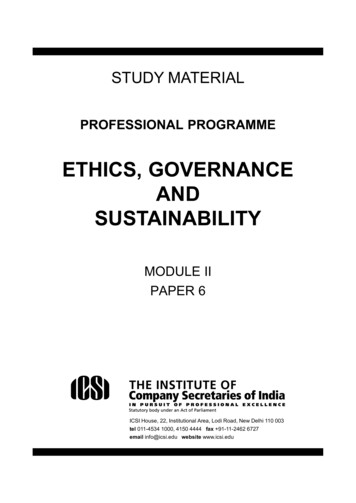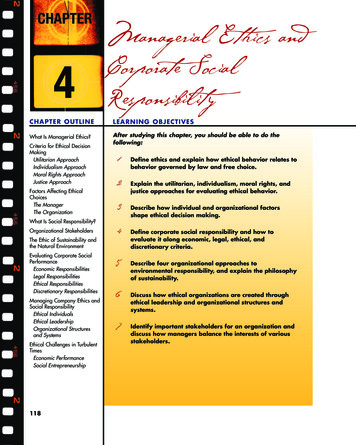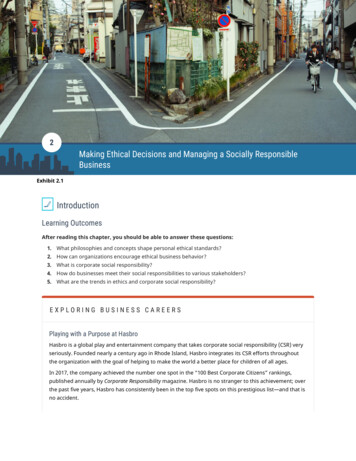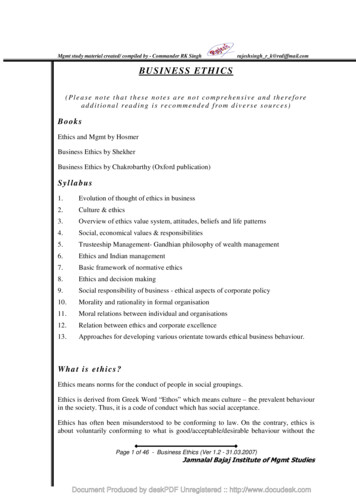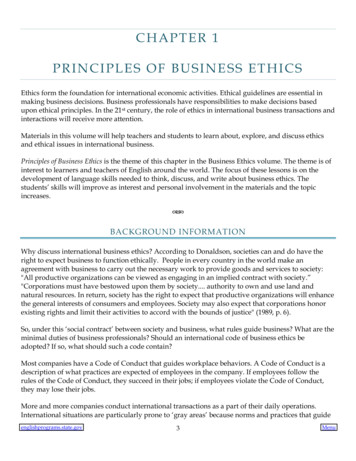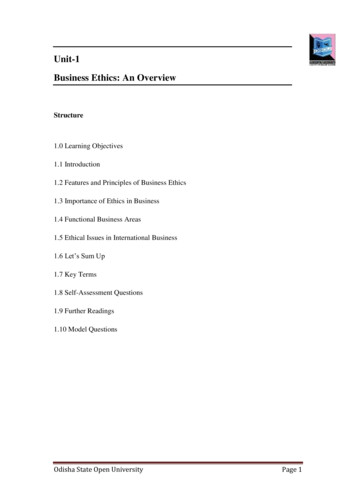
Transcription
Unit-1Business Ethics: An OverviewStructure1.0 Learning Objectives1.1 Introduction1.2 Features and Principles of Business Ethics1.3 Importance of Ethics in Business1.4 Functional Business Areas1.5 Ethical Issues in International Business1.6 Let’s Sum Up1.7 Key Terms1.8 Self-Assessment Questions1.9 Further Readings1.10 Model QuestionsOdisha State Open UniversityPage 1
1.01.1LEARNING OBJECTIVES After going through this Unit, you will be able to: Understand what is business ethics Appreciate the global nature of business ethics Be aware of the prevalence of unethical behavior around the world Appreciate the benefits of ethical companies Understand the types of business ethics issuesINTRODUCTIONThe term ethics is derived from the Greek word ‘ethos’, which means character.Ethics is a branch of social sciences, which deals with concepts such as right andwrong, good and bad, fair and unfair, just and unjust, legal and illegal, moral andimmoral, proper and improper in respect of human actions.Ethics is a subject of social science that is related with moral principles and socialvalues. 'Business Ethics' can be termed as a study of proper business policies andpractices regarding potentially controversial issues, such as corporate governance,insider trading, bribery, discrimination, corporate social responsibility, andfiduciary responsibilities. Law often guides business ethics, while other timesbusiness ethics provide a basic framework that businesses may choose to followto gain public acceptance.Businesses must abide by some basic principles. It should provide quality goodsand services at reasonable prices to their consumers. It must also avoidadulteration, misleading advertisements, and other unfair malpractices.Odisha State Open UniversityPage 2
A business must also perform other duties such as distributing fair wages,providing good working conditions, not exploiting the workers, encouragingcompetition, etc. Business ethics ensure that a certain required level of trust existsbetween consumers and various forms of market participants with businesses. Forexample, a portfolio manager must give the same consideration to the portfolios offamily members and small individual investors. Such practices ensure that thepublic receives fair treatment.Business Ethics – DefinitionThere are many definitions of business ethics, but the ones given by AndrewCrane, Raymond C. Baumhart and Thomas M. Garett are considered the mostappropriate ones.According to Crane, "Business ethics is the study of business situations, activities,and decisions where issues of right and wrong are addressed."Baumhart defines, "The ethics of business is the ethics of responsibility. Thebusiness man must promise that he will not harm knowingly."Garett defines “Business Ethics is primarily concerned with the relationship ofbusiness goals and techniques to specific human needs”.Odisha State Open UniversityPage 3
The concept of business ethics arose in the 1960s as companies became moreaware of a rising consumer-based society that showed concerns regarding theenvironment, social causes and corporate responsibility. Business ethics goesbeyond just a moral code of right and wrong; it attempts to reconcile whatcompanies must do legally versus maintaining a competitive advantage over lways.Ethics are broadly described in the literature as moral principles about right andwrong, honourable behaviour reflecting values, or standards of conduct. Honesty,openness, responsiveness, accountability, due diligence, and fairness are coreethical principles. Ethics are moral guidelines which govern good behaviour. Sobehaving ethically is doing what is morally right. Behaving ethically in business iswidely regarded as good business practice.Ethical principles and standards in business: Define acceptable conduct in business Should underpin how management make decisionsAn important distinction to remember is that behaving ethically is not quite thesame thing as behaving lawfully: Ethics are about what is right and what is wrong Law is about what is lawful and what is unlawfulAn ethical decision is one that is both legal and meets the shared ethical standardsof the communityBusinesses face ethical issues and decisions almost every day – in some industriesthe issues are very significant. For example: Should businesses profit from problem gambling? Is ethical shopping a luxury we can't afford? Should fashion retailers use suppliers who don't pay a living wage? Should supermarkets dispose of out-of-date groceries or give them to foodbanks?Odisha State Open UniversityPage 4
You will probably note the link between business ethics and corporate socialresponsibility (CSR). The two concepts are closely linked: A socially responsible firm should be an ethical firm An ethical firm should be socially responsibleHowever, there is also a distinction between the two: CSR is about responsibility to all stakeholders and not just shareholders Ethics is about morally correct behaviourHow do businesses ensure that its directors, managers and employees actethically?A common approach is to implement a code of practice. Ethical codes areincreasingly popular – particularly with larger businesses and cover areas such as: Corporate social responsibility Dealings with customers and supply chain Environmental policy and actions Rules for personal and corporate integrityEthics are the building block of our society and thus should be the building blockof our corporations. Henry Kravis states, “If you build that foundation, moral andthe ethical foundation, as well as the business foundation then the building won'tcrumble.”1.2FEATURES AND PRINCIPLES OF BUSINESS ETHICSTo understand business ethics, it is necessary to know its importantcharacteristics. These are:(i) A Discipline: Business ethics are the guiding principles of business function. Itis the knowledge through which human behavior is learnt in a business situation.(ii) Ancient Concept: Business ethics is an ancient concept. It has it origin withthe development of human civilization.Odisha State Open UniversityPage 5
(iii) Personal Dignity: The principles of ethics develop the personal dignity.Many of the problems of ethics arise due to not giving dignity to individual. Allthe business decisions should be aimed by giving dignity to the customers,employees, distributors, shareholders and creditors, etc. otherwise they develop inimmorality in the business conducts.(iv) Related to Human Aspect: Business ethics studies those activities, decisionsand behaviours which are concerned with human aspect. It is the function of thebusiness ethics to notify those decisions to customers, owners of business,government, society, competitors and others on good or bad, proper or improperconduct of business.(v) Study of Goals and Means: Business ethics is the study of goals and meansfor the rational selection of sacred objects and their fulfillment. It accepts theprinciples of “Pure goals inspire for pure means” and “Means justifies the end”. Itis essential that goals and means should be based on morals.(vi) Different from Social Responsibility: Social responsibility mainly relates tothe policies and functions of an enterprise, whereas business ethics to the conductand behaviour of businessmen. But it is a fact that social responsibility of businessand its policies is influenced by the business ethics.(vii) Greater than Law: Although the law approves various social decisions, thelaw is not greater than ethics. Law is usually related to the minimum control ofsocial customs whereas ethics gives importance to individual and social welfareactions.Features of Business EthicsThere are eight major features of business ethics Code of Conduct Business ethics is actually a form of codes of conduct.It lets us know what to do and what not to do. Businesses must follow thiscode of conduct. Based on Moral and Social Values Business ethics is a subject that isbased on moral and social values. It offers some moral and socialprinciples (rules) for conducting a business.Odisha State Open UniversityPage 6
Protection to Social Groups Business ethics protect various nesspersons,government, shareholders, creditors, etc. Offers a Basic Framework Business ethics is the basic framework fordoing business properly. It constructs the social, cultural, legal, economic,and other limits in which a business must operate. Voluntary Business ethics is meant to be voluntary. It should be selfpracticed and must not be enforced by law. Requires Education & Guidance Businessmen should get propereducation and guidance about business ethics. Trade Associations andChambers of Commerce should be active enough in this matter. Relative Term Business ethics is a relative term. It changes from onebusiness to another and from one country to another. New Concept Business ethics is a relatively newer concept. Developedcountries have more exposure to business ethics, while poor anddeveloping countries are relatively backward in applying the principles ofbusiness ethics.Principles of Business EthicsThe principles of business ethics are related to social groups that comprise ofconsumers, employees, investors, and the local community. The important rules orprinciples of business ethics are as follows Avoid Exploitation of Consumers Do not cheat and exploit consumerwith measures such as artificial price rise and adulteration. Avoid Profiteering Unscrupulous business activities such as hoarding,black-marketing, selling banned or harmful goods to earn exorbitantprofits must be avoided. Encourage Healthy Competition A healthy competitive atmospherethat offers certain benefits to the consumers must be encouraged. Ensure Accuracy Accuracy in weighing, packaging and quality ofsupplying goods to the consumers has to be followed. Pay Taxes Regularly Taxes and other duties to the government must behonestly and regularly paid.Odisha State Open UniversityPage 7
Get the Accounts Audited Proper business records, accounts must bemanaged. All authorized persons and authorities should have access tothese details. Fair Treatment to Employees Fair wages or salaries, facilities andincentives must be provided to the employees. Keep the Investors Informed The shareholders and investors mustknow about the financial and other important decisions of the company. Avoid Injustice and Discrimination Avoid all types of injustice andpartiality to employees. Discrimination based on gender, race, religion,language, nationality, etc. should be avoided. No Bribe and Corruption Do not give expensive gifts, commissionsand payoffs to people having influence. Discourage Secret Agreement Making secret agreements with otherbusiness people to influence production, distribution, pricing etc. areunethical. Service before Profit Accept the principle of "service first and profitnext." Practice Fair Business Businesses should be fair, humane, efficient anddynamic to offer certain benefits to consumers. Avoid Monopoly No private monopolies and concentration of economicpower should be practiced. Fulfill Customers’ Expectations Adjust your business activities as perthe demands, needs and expectations of the customers. Respect Consumers Rights Honor the basic rights of the consumers. Accept Social Responsibilities Honor responsibilities towards thesociety. Satisfy Consumers’ Wants Satisfy the wants of the consumers as themain objective of the business is to satisfy the consumer’s wants. Allbusiness operations must have this aim. Service Motive Service and consumer's satisfaction should get moreattention than profit-maximization. Optimum Utilization of Resources Ensure optimum utilization ofresources to remove poverty and to increase the standard of living ofpeople.Odisha State Open UniversityPage 8
Intentions of Business Use permitted legal and sacred means to dobusiness. Avoid Illegal, unscrupulous and evil means.Follow Woodrow Wilson's rules There are four important principles ofbusiness ethics. These four rules are as follows Rule of publicity According to this principle, the business must tell thepeople clearly, what it tends to do. Rule of equivalent price The customer should get proper value for theirmoney. Below standard, outdated and inferior goods should not be sold athigh prices. Rule of conscience in business The businesspersons must haveconscience while doing business, i.e. a morale sense of judging what isright and what is wrong. Rule of spirit of service The business must give importance to theservice motive.Example of Unethical Business PracticesSatyam Computers, a global IT company, was defamed in a notorious list ofcompanies involved in fraudulent financial activities. The list includes names suchas Enron, WorldCom, Parmalat, Ahold, Allied Irish, Bearings and KidderPeabody.Satyam’s CEO, Ramalinga Raju, accepted his role in a broad accountingimpropriety that had overstated the company’s net revenue and profit. Thecompany had earlier reported a cash reserve of approximately 1.04 billion thatactually existed only in books but not in reality.Odisha State Open UniversityPage 9
In his letter to his board, exposing the fraud, Satyam’s Raju showed thepropensity of the fraud. He stated that, “What started as a marginal gap betweenactual operating profits and ones reflected in the books of accounts continued togrow over the years. It has attained unmanageable proportions. ” Later, hedescribed the process as “like riding a tiger, not knowing how to get off withoutbeing eaten.”12 Ethical Principles for Business ExecutivesEthical values, translated into active language establishing standards or rulesdescribing the kind of behaviour an ethical person should and should not engagein, are ethical principles. The following list of principles incorporates thecharacteristics and values that most people associate with ethical behaviour.1. HONESTY. Ethical executives are honest and truthful in all their dealings andthey do not deliberately mislead or deceive others by misrepresentations,overstatements, partial truths, selective omissions, or any other means.2. INTEGRITY. Ethical executives demonstrate personal integrity and thecourage of their convictions by doing what they think is right even when there isgreat pressure to do otherwise; they are principled, honorable and upright; theywill fight for their beliefs. They will not sacrifice principle for expediency, behypocritical, or unscrupulous.Odisha State Open UniversityPage 10
3. PROMISE-KEEPING & TRUSTWORTHINESS. Ethical executives areworthy of trust. They are candid and forthcoming in supplying relevantinformation and correcting misapprehensions of fact, and they make everyreasonable effort to fulfill the letter and spirit of their promises and commitments.They do not interpret agreements in an unreasonably technical or legalisticmanner in order to rationalize non-compliance or create justifications for escapingtheir commitments.4. LOYALTY. Ethical executives are worthy of trust, demonstrate fidelity andloyalty to persons and institutions by friendship in adversity, support and devotionto duty; they do not use or disclose information learned in confidence for personaladvantage. They safeguard the ability to make independent professionaljudgments by scrupulously avoiding undue influences and conflicts of interest.They are loyal to their companies and colleagues and if they decide to acceptother employment, they provide reasonable notice, respect the proprietaryinformation of their former employer, and refuse to engage in any activities thattake undue advantage of their previous positions.5. FAIRNESS. Ethical executives and fair and just in all dealings; they do notexercise power arbitrarily, and do not use overreaching nor indecent means to gainor maintain any advantage nor take undue advantage of another’s mistakes ordifficulties. Fair persons manifest a commitment to justice, the equal treatment ofindividuals, tolerance for and acceptance of diversity, the they are open-minded;they are willing to admit they are wrong and, where appropriate, change theirpositions and beliefs.6. CONCERN FOR OTHERS. Ethical executives are caring, compassionate,benevolent and kind; they like the Golden Rule, help those in needs, and seek toaccomplish their business objectives in a manner that causes the least harm andthe greatest positive good.7. RESPECT FOR OTHERS. Ethical executives demonstrate respect for thehuman dignity, autonomy, privacy, rights, and interests of all those who have astake in their decisions; they are courteous and treat all people with equal respectand dignity regardless of sex, race or national origin.Odisha State Open UniversityPage 11
8. LAW ABIDING. Ethical executives abide by laws, rules and regulationsrelating to their business activities.9. COMMITMENT TO EXCELLENCE. Ethical executives pursue excellencein performing their duties, are well informed and prepared, and constantlyendeavor to increase their proficiency in all areas of responsibility.10. LEADERSHIP. Ethical executives are conscious of the responsibilities andopportunities of their position of leadership and seek to be positive ethical rolemodels by their own conduct and by helping to create an environment in whichprincipled reasoning and ethical decision making are highly prized.11. REPUTATION AND MORALE. Ethical executives seek to protect andbuild the company’s good reputation and the morale of its employees by engagingin no conduct that might undermine respect and by taking whatever actions arenecessary to correct or prevent inappropriate conduct of others.12. ACCOUNTABILITY. Ethical executives acknowledge and accept personalaccountability for the ethical quality of their decisions and omissions tothemselves, their colleagues, their companies, and their communities.1.3IMPORTANCE OF ETHICS IN BUSINESSSeveral factors play a role in the success of a company that is beyond the scopeof financial statements alone. Organizational culture, management philosophy andethics in business each have an impact on how well a business performs in thelong term. No matter the size, industry or level of profitability of an organization,business ethics are one of the most important aspects of long-term success.Ethics in Leadership: - The management team sets the tone for how the entirecompany runs on a day-to-day basis. When the prevailing managementphilosophy is based on ethical practices and behaviour, leaders within anorganization can direct employees by example and guide them in makingdecisions that are not only beneficial to them as individuals, but also to theorganization as a whole. Building on a foundation of ethical behaviour helpscreate long lasting positive effects for a company, including the ability to attractOdisha State Open UniversityPage 12
and retain highly talented individuals and building and maintaining a positivereputation within the community. Running a business in a ethical manner from thetop down builds a stronger bond between individuals on the management team,further creating stability within the company.Employee Ethics: - When management is leading an organization in an ethicalmanner, employees follow in those footsteps. Employees make better decisions inless time with business ethics as a guiding principle; this increases productivityand overall employee morale. When employees complete work in a way that isbased on honesty and integrity, the whole organization benefits. Employees whowork for a corporation that demands a high standard of business ethics in allfacets of operations are more likely to perform their job duties at a higher leveland are also more inclined to stay loyal to that organization.Business Ethics Benefits: - The importance of business ethics reaches far beyondemployee loyalty and morale or the strength of a management team bond. As withall business initiatives, the ethical operation of a company is directly relatedto profitability in both the short and long term. The reputation of a business fromthe surrounding community, other businesses and individual investors isparamount in determining whether a company is a worthwhile investment. If acompany's reputation is less than perfect based on the perception that it does notoperate ethically, investors are less inclined to buy stock or otherwise support itsoperations.With consistent ethical behavior comes increasingly positive public image, andthere are few other considerations as important to potential investors andcurrent shareholders. To retain a positive image, businesses must be committed tooperating on an ethical foundation as it relates to treatment of employees, respectto the surrounding environment and fair market practices in terms of price andconsumer treatment.Ethics concern an individual's moral judgements about right and wrong. Decisionstaken within an organization may be made by individuals or groups, but whoevermakes them will be influenced by the culture of the company. The decision tobehave ethically is a moral one; employees must decide what they think is theright course of action. This may involve rejecting the route that would lead to thebiggest short-term profit.Odisha State Open UniversityPage 13
Ethical behaviour and corporate social responsibility can bring significant benefitsto a business. For example, they may: attract customers to the firm's products, thereby boosting sales and profits make employees want to stay with the business, reduce labour turnoverand therefore increase productivity attract more employees wanting to work for the business, reducerecruitment costs and enable the company to get the most talentedemployees attract investors and keep the company's share price high, therebyprotecting the business from takeover.Unethical behaviour or a lack of corporate social responsibility, by comparison,may damage a firm's reputation and make it less appealing to stakeholders. Profitscould fall as a result.Factors highlighting the importance of business ethicsWe can cite four major factors which highlight the importance of business ethics:1. Long-term growth: sustainability comes from an ethical long-term visionwhich takes into account all stakeholders. Smaller but sustainable profitslong-term must be better than higher but riskier short-lived profits.2. Cost and risk reduction: companies which recognize the importance ofbusiness ethics will need to spend less protecting themselves from internaland external behavioural risks, especially when supported by soundgovernance systems and independent research3. Anti-capitalist sentiment: the financial crisis marked another blow for thecredibility of capitalism, with resentment towards bank bailouts at the costof fundamental rights such as education and healthcare.4. Limited resources: the planet has finite resources but a growingpopulation; without ethics, those resources are replete for purely individualgain at huge cost both to current and future generations.Odisha State Open UniversityPage 14
1. Long-term growthLarge profits are always attractive, potentially allowing faster achievement ofstrategic goals, a greater provision against risk and a greater sense of success andstability. However, there are countless examples in corporate history of dramaticboom and bust cycles (both on a micro, corporation level and macro-economiclevel). Now, more than ever, we need to re-evaluate our endless search for biggerand bigger profits with the bigger and bigger risks that entails. The financial crisiswhich began in 2008 is painful evidence of that. Whole countries have gone to thebrink of bankruptcy as a result of an unwillingness or inability to plan long-term.More and more organizations are recognizing what most owner-run businesseshave always known: that stable profits are a better bet in the long run than largeprofits now and an uncertain future. It is on the long term which we must focus toavoid the blindness which leads to such huge corporate collapses as LehmanBrothers (2008) and such huge risks and balance sheet holes as Morgan Stanley(as late as 2012). Even the largest remaining investment banks like GoldmanSachs are having to recognize this (if only to try and fend off more aggressiveregulation) and attempting to make their bonus allocations more dependent onlonger term value than the current year’s performance. One can only hope that theheads of such organizations recognize the importance of business ethics and theresulting need to change to a more sustainable model of growth. Certainly theonly way to change the huge, unwieldy vessel that is global business is to focus onthe business benefits. While it may seem contradictory and hypocritical to placeself-interest at the heart of change for the better, it is the only conclusion thatseems to offer hope.Fundamentally, the importance of business ethics is driven by personal ethics andmorality and most people are fundamentally self-interested. But, if it is in people’sbest interest to be ethical, this has the potential to drive real change. It is alreadyhappening in several consumer markets where demand is shifting to ethicalproducts and social networks are instrumental in spreading stories about unethicalpractices. (Sadly, very rarely is positive action rewarded with the same degree ofenthusiasm but with some good - but earnest - marketing, it can be given a kickstart and be highly successful long term.)Odisha State Open UniversityPage 15
2. Cost and risk reductionA precedent which argues the case made above is the Quality Managementindustry. In the West, this sprung up in the early 1980s, when products began tobe inspected before leaving the factory in an attempt to reduce the amount ofcostly customer complaints. Now, most products come with at least a one-yearwarranty and in the case of some car manufacturers, up to five years. What startedoff as a self-interested need to reduce costs has led to more reliableproducts. Meanwhile, we offer another analogy from wider society. Just aswidespread bribery and corruption in society are recognized as being inimical tothe development of a healthy economy, similarly the lack of a high standard ofethical behaviour in a company is inimical to trust and loyalty, which in turn has adetrimental effect on the health of the company over the longer term.It may be argued that an owner can run a business in whichever way he or shewishes, and at first glance there would appear to be a case for this so long as noother shareholders are involved, and only his or her money is at risk, and of coursewith the acquiescence of the employees and trading partners. However, in manyyears of observing different standards of behaviour in different businesscircumstances, one recognizes the relationship between the perception of ethicswhich permeates an organization and the degree of trust and loyalty presentamong employees and between staff and management. The conclusion onereaches is that loyalty and trust have a significant value in terms of the efficiencyand effectiveness with which a business can be run, and the concomitant cost ofcontrolsystemsneeded.In other words, a highly ethical operation is likely to spend much less onprotecting itself against fraud and will probably have to spend much less onindustrial relations to maintain morale and common purpose. This should bemotivation in itself to recognize the importance of business ethics and instill goodcorporate governance in any organization.Odisha State Open UniversityPage 16
Importance of Business Ethics: Pressures on Long-Term Growth3. Anti-capitalist sentimentThe eye-watering profits of some of the world’s largest corporations attract a lotof negative sentiment from those outside the world of business and finance. Whileclearly a result of the scale of these organizations, there is always a suspicion thatthese profits have been achieved through not entirely ethical means - and in somecases downright unethical means, often resulting in major public failures, mostrecently in Japan, where the senior management of Nomura resigned en masseafteraninsidertradingscandal.Banks in particular receive a lot of bad publicity over profits and executive pay(especially bonuses), and while not always justified, the fact is, an industry at thecentre of the credit crunch and resulting economic and financial crisis continuedto produce hefty profits and bonuses even while making large numbers redundant.This is, of course, a huge generalization and simplification of the issue but it is thenatural reaction of the general public, who lack such detailed information andunderstanding. Public sentiment cannot be ignored. This situation makes theimportance of business ethics all the more pressing in the 21st century.4. Limited resourcesOne irrefutable fact is that this planet has limited resources. Probably the biggestfailure in human development over the last three hundred years has been inOdisha State Open UniversityPage 17
recognizing that and attempting to minimize use and maximize re-use andrecycling. While there are now global initiatives to try and reverse this trend, andmuch progress has been made, there is still a long way to go. In the majordeveloping economies, especially, history is repeating itself on a massive scale.With notable exceptions, this applies not only to specific environmental andsustainability issues but to corporate governance generally and the importance ations.This is another example of short-termism prevailing over long-term vision andpreservation of limited resources for future generations - and in some cases thesame generation, as in deforestation driving native peoples and animal species tothe point of extinction. Just as basic financial management requires planning toensure capital res
Business Ethics: An Overview Structure 1.0 Learning Objectives 1.1 Introduction 1.2 Features and Principles of Business Ethics 1.3 Importance of Ethics in Business 1.4 Functional Business Areas 1.5 Ethical Issues in International Business 1.6 Let’s Sum Up 1.7 Key Terms 1.8 Self-Asses


